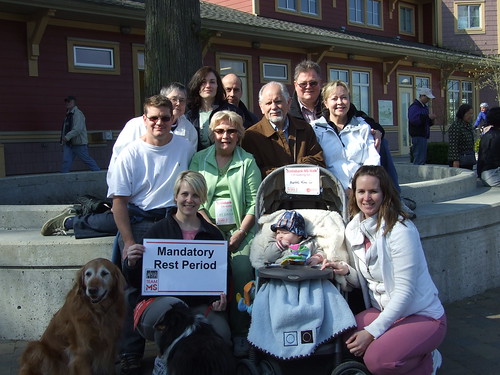
We raised 2588.00 this year!
The Best of Two Worlds Collide!
Knitters Against MS! Team Claudia has raised just over 10,000 dollars for the National MS Society. Impressive.
Beach Time

So did Sydney (a friends dog) who I was trying to get some good photos of.

Sydney doesn't much care for going in the water, but she likes to look out at it:

Sadie also likes to sit and look pretty for the camera. Nevermind the food that was being offered behind the lens :)

Ocean Motion
Vitamin D - more news
"According to research presented at the annual meeting of the American Academy of Neurology, high doses of the vitamin appear safe for patients with MS and may even lead to a reduction in disease relapses.
Dr. Jodie Burton, a neurologist at the University of Toronto, studied 25 people with relapsing-remitting multiple sclerosis, a form of the illness characterized by relapses during which new symptoms can appear or old ones resurface.
The patients were given an average of 14,000 international units (IU) of vitamin D3 a day for a year and then evaluated. Twenty-four other participants were allowed to take as much as 4,000 IU of vitamin D3 a day, though most averaged about 1,000 IU daily -- the amount recommended by many MS specialists.
Both groups also took 1,200 milligrams of calcium a day.
Burton's team found that only 14 per cent of those taking the high doses suffered relapses in their disease. In contrast, close to 40 per cent of the other MS patients relapsed. As well, those taking the high doses suffered 41 per cent fewer relapses than the year before the study began, compared with 17 per cent of those taking smaller doses.
Michel Cottier was one of the participants testing the safety of the high vitamin D dose. Before trying the treatment, Cottier would suffer an MS attack every nine months or so, in which he suddenly couldn't walk or move his arm.
"You have to stop working. You can't help your wife with the children anymore... simply, you can't use your body as you used to," he told CTV.
After the year on the high vitamin D dose, he hasn't relapsed in two and a half years, with no side effects, including no effect on calcium level abnormalities. Cottier is still taking about 6,000 IU of vitamin D a day, convinced it will ensure that his MS attacks won't return.
Dr. Paul O'Connor of MS Society of Canada said the results are positive, but they are still preliminary.
"I think the results showing that vitamin D reduces attacks... require confirmation in a properly designed study," he said.
"To me, it is extremely intriguing ... vitamin D is safe, it's cheap, and if we could show it helps patients with MS, it would be a huge step forward in making their lives easier."
The best results in the study were only observed in those who took the larger doses. People in the high-dose group were given escalating doses of the vitamin for six months, to a maximum of 40,000 IU daily. Doses were then gradually lowered over the next six months, averaging out to 14,000 IU daily for the year.
Burton advises MS patients to talk to their doctors before beginning vitamin D supplements, noting that too much of the vitamin can be harmful for people with certain medical conditions such as kidney disease.
O'Connor advises other MS patients not to take too much vitamin D, suggesting they not exceed 2,000 IU to 4,000 IU units a day until further research can prove that higher doses aren't dangerous.
Breastfeeding may lower risk of MS relapse
"The women were interviewed about their MS symptoms during each trimester of their pregnancies and then about their breastfeeding and menstruation history every few months in the 12 months after they gave birth.
The women with MS were more likely not to breastfeed and to begin supplemental formula feeding during their baby's first two months of life compared to the healthy women, the researchers found.
Of the 52 per cent of women with MS who did not breastfeed or who began regular supplemental feedings, 87 per cent had a relapse within a year of their babies' births. That compared to just 36 per cent of the women with MS who breastfed exclusively for at least two months.
The researchers note that the mothers who breastfed exclusively had significantly prolonged "lactational amenorrhea" (absence of a period), which seemed to be linked to a decreased risk of relapse in MS.
When the researchers asked the mothers with MS why some chose not to breastfeed exclusively, the women reported that their primary reason was so that they could begin taking their MS medications again. The medications, including interferon beta and natalizumab, work by modifying the immune system and are not recommended for use during pregnancy or breastfeeding.
The results of this study suggest that women with MS should be encouraged to breastfeed exclusively for at least the first two months instead of resuming medications, the authors conclude.
"Our findings call into question the benefit of foregoing breastfeeding to start MS therapies," they write, adding that larger studies are needed to confirm the findings.
The researchers say they aren't sure why breastfeeding might be beneficial to women with autoimmune diseases such as MS.
"Studies of immunity and breastfeeding, while plentiful, are predominantly focused on breast milk content and health benefits to the infant. Little is known about maternal immunity during breastfeeding."


